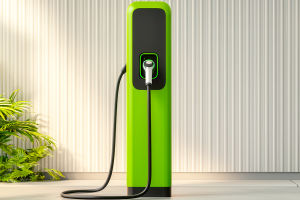The automotive industry is at a critical juncture. As the world grapples with climate change and environmental concerns, car manufacturers are increasingly turning their focus to sustainable practices.
In fact, the future of the automotive industry lies in green car manufacturing—designing and producing vehicles that are not only eco-friendly but also built in a way that minimizes environmental harm. Let's explore how the industry is evolving and what innovations are driving this shift.
The Shift Towards Electric Vehicles (EVs)
One of the most significant advancements in green car manufacturing is the widespread shift towards electric vehicles (EVs). These vehicles, powered by electricity rather than fossil fuels, have gained significant traction over the last decade. In 2023, nearly 10 million EVs were sold worldwide, a number that continues to grow as manufacturers increase production and consumers make the switch to more sustainable transportation.
What makes EVs so appealing is their ability to drastically reduce carbon emissions. Unlike traditional gasoline-powered cars, which release harmful gases into the atmosphere, EVs emit zero tailpipe emissions. This makes them an essential part of the effort to combat climate change. Companies like Tesla, Volkswagen, and Nissan are at the forefront, with many other manufacturers following suit.
However, as the demand for electric cars increases, so does the need for clean energy sources to power them. The environmental impact of EVs depends not just on the vehicles themselves but on how the electricity that charges them is generated. As renewable energy sources like solar, wind, and hydroelectric power become more widespread, the carbon footprint of EVs will continue to decrease.
Sustainable Materials in Manufacturing
While the transition to electric vehicles is vital, it's just one piece of the puzzle. Sustainable materials are also a key factor in making car manufacturing more eco-friendly. Traditionally, cars are made using steel, aluminum, plastic, and other materials that require substantial energy to produce and have a significant environmental impact. However, the industry is shifting towards using more sustainable alternatives.
For example, manufacturers are turning to recycled materials like recycled steel, plastics, and rubber. The use of bio-based plastics and natural fibers is also increasing. Not only does this help reduce the environmental impact of manufacturing, but it also reduces the need for raw material extraction, which can be harmful to ecosystems.
Another exciting development is the use of lightweight materials, such as carbon fiber and advanced composites, which not only reduce the weight of the vehicle, making it more fuel-efficient but also require fewer resources to produce. By using more sustainable materials, car manufacturers are reducing the overall carbon footprint of the vehicles they produce.
Energy-Efficient Manufacturing Practices
The manufacturing process itself is another area where innovation is helping to reduce carbon emissions. Car manufacturers are increasingly adopting energy-efficient practices in their factories to lower their carbon footprints. Companies like BMW and Toyota are leading the way in using renewable energy to power their production lines.
For instance, BMW's Leipzig plant runs entirely on renewable energy, and Toyota has committed to reducing its carbon emissions by 90% across its manufacturing operations by 2050. Automation and robotics in the production process also help to reduce energy consumption by increasing efficiency and reducing waste.
Moreover, the concept of circular economy is being integrated into car manufacturing. This involves designing cars in a way that allows for easier recycling at the end of their life cycle. By focusing on reusing and recycling materials, manufacturers can ensure that their vehicles have a minimal impact on the environment, even after they've been used.
Hydrogen Fuel Cells: A Viable Alternative?
While electric vehicles are taking the lead in green car manufacturing, hydrogen fuel cells offer another exciting alternative for reducing the automotive industry's carbon emissions. Hydrogen-powered cars run on a chemical process that combines hydrogen and oxygen to generate electricity, emitting only water vapor as a byproduct.
Hydrogen fuel cells are particularly attractive for certain vehicle types, such as heavy-duty trucks and long-distance vehicles, where electric batteries may not be as practical due to their weight or limited range. However, there are still challenges to overcome. The production and distribution of hydrogen remain expensive and energy-intensive, and hydrogen infrastructure is limited in many parts of the world.
Nevertheless, some manufacturers like Toyota and Hyundai are pushing forward with hydrogen fuel cell technology, and Japan and South Korea are investing heavily in building hydrogen refueling stations. If these hurdles can be overcome, hydrogen-powered vehicles could play an important role in the future of green car manufacturing.
The Role of Consumers in Driving Change
As consumers, we also have a vital role to play in driving the shift towards greener vehicles. The demand for sustainable cars is crucial for automakers to continue innovating and investing in eco-friendly technologies. By choosing electric, hybrid, or hydrogen-powered vehicles, we can encourage manufacturers to ramp up their efforts in creating sustainable vehicles.
Furthermore, consumers can support car manufacturers who prioritize sustainable practices in their production processes. As the green car market grows, it's important to make informed choices about the vehicles we purchase, taking into account their environmental impact and the manufacturer's commitment to sustainability.
Conclusion: Moving Toward a Greener Future
The future of green car manufacturing is bright, but it will require continued innovation and collaboration from all stakeholders in the automotive industry. From the shift to electric vehicles and the use of sustainable materials to the adoption of energy-efficient manufacturing practices and alternative fuels like hydrogen, car manufacturers are making significant strides toward a more sustainable future.
As consumers, we have the power to influence the direction of the automotive industry. By choosing environmentally friendly vehicles and supporting companies committed to sustainable practices, we can help create a world where green cars are the norm, not the exception.
What are your thoughts on the future of green car manufacturing? Would you be open to purchasing a fully electric or hydrogen-powered vehicle in the near future? Let us know your thoughts in the comments!


